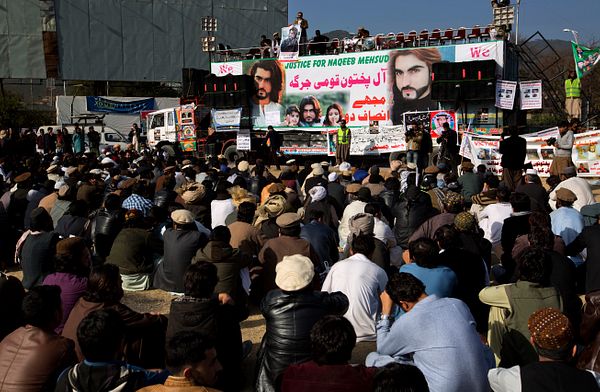
Clamping down on any form of dissent or protest has long been the policy of the Pakistani state and that appears to have continued during the Covid19 pandemic as well. Investigative stories show how during this pandemic, activists and students in remote Pakistani regions have protested a lack of Internet access but these have failed to prompt Pakistan to grant Internet access to millions in regions reeling from decades of conflict, poverty, and underdevelopment.
According to a report in Gandhara RFE/RL, “Since March, students across FATA have protested the lack of Internet access since the coronavirus pandemic forced universities to shut down campuses and instead rely on online classes. Late last month police in Quetta, capital of the restive southwestern Balochistan Province, arrested some 100 students who rallied to demand Internet access. In the mountainous northwestern region of Gilgit-Baltistan, which borders China, students protested this week with the same demand.”
In Balochistan, “nine of its 32 districts have no Internet access. The vast province bordering Iran and Afghanistan has been reeling from a separatist insurgency for more than two decades, and tens of thousands of civilians have been killed in militant attacks and military operations. Gilgit-Baltistan, home to some of the tallest mountains in the world and bordering China and the disputed Himalayan region of Kashmir with India, also lacks digital infrastructure. “I have to walk kilometers daily to attend my classes,” Rasheed Kamil, a student from the region, wrote on Twitter. Students in the region have been trending #Internet4GilgitBaltistan this month to demand Internet connectivity.”
This led the provincial legislature in the northwestern Khyber Pakhtunkhwa Province to adopt “a unanimous resolution calling on the federal authorities to “provide Internet on an emergency basis” to parts of the province that once served as the key theater in the global war on terrorism. “In the 21st century, districts from Bajaur to South Waziristan are deprived of 3G and 4G networks or any Internet connectivity,” lawmaker Mir Kalam Wazir told Khyber Pakhtunkhwa’s provincial assembly on July 6. Bajaur and South Waziristan are at the northern and southern ends, respectively, of the 600-kilometer strip that previously formed the Federally Administered Tribal Areas (FATA) along Pakistan’s western border with Afghanistan. “This is a major issue for us,” he added.”
According to Usama Khilji, the director of Bolo Bhi, an Internet freedom and advocacy watchdog, “The Pakistani state often cites security reasons for denying the basic right of the Internet, which is linked to accessing the right to freedom of expression and the right to information. This narrative must be challenged, as millions of Pakistanis are being denied the basic linked rights of education and access to critical health-related information, as well. Instead of shutting or denying the Internet, they should go after the militant groups, some of whom are regrouping in the tribal areas,” he said, alluding to increasing violence in former FATA, where tens of thousands of civilians were killed and millions displaced during a decade of unrest following the emergence of the Taliban and Al-Qaeda in the years following the terrorist attacks of 9/11.”
![]()





